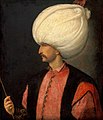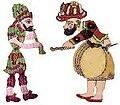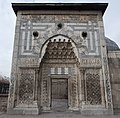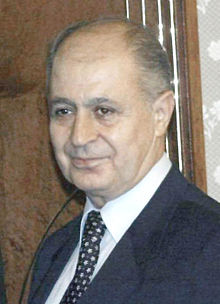Our website is made possible by displaying online advertisements to our visitors.
Please consider supporting us by disabling your ad blocker.
Portal:Turkey
Merhaba! Türkiye portalına hoş geldiniz. Hi! Welcome to the Turkey portal.
 | |
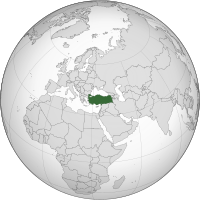
| |
Turkey, officially the Republic of Türkiye, is a country mainly located in Anatolia in West Asia, with a small part called East Thrace in Southeast Europe. It borders the Black Sea to the north; Georgia, Armenia, Azerbaijan, and Iran to the east; Iraq, Syria, and the Mediterranean Sea to the south; and the Aegean Sea, Greece, and Bulgaria to the west. Turkey is home to over 85 million people; most are ethnic Turks, while ethnic Kurds are the largest ethnic minority. Officially a secular state, Turkey has a Muslim-majority population. Ankara is Turkey's capital and second-largest city, while Istanbul is its largest city and economic and financial center. Other major cities include İzmir, Bursa, and Antalya.
Turkey was first inhabited by modern humans during the Late Paleolithic. Home to important Neolithic sites like Göbekli Tepe and some of the earliest farming areas, present-day Turkey was inhabited by various ancient peoples. The Hattians were assimilated by the Anatolian peoples, such as the Hittites. Classical Anatolia transitioned into cultural Hellenization following the conquests of Alexander the Great; Hellenization continued during the Roman and Byzantine eras. The Seljuk Turks began migrating into Anatolia in the 11th century, starting the Turkification process. The Seljuk Sultanate of Rum ruled Anatolia until the Mongol invasion in 1243, when it disintegrated into Turkish principalities. Beginning in 1299, the Ottomans united the principalities and expanded. Mehmed II conquered Constantinople (now known as Istanbul) in 1453. During the reigns of Selim I and Suleiman the Magnificent, the Ottoman Empire became a global power. From 1789 onwards, the empire saw a major transformation, reforms, and centralization while its territory declined.
In the 19th and early 20th centuries, persecution of Muslims during the Ottoman contraction and in the Russian Empire resulted in large-scale loss of life and mass migration into modern-day Turkey from the Balkans, Caucasus, and Crimea. Under the control of the Three Pashas, the Ottoman Empire entered World War I in 1914, during which the Ottoman government committed genocides against its Armenian, Greek, and Assyrian subjects. Following Ottoman defeat, the Turkish War of Independence resulted in the abolition of the sultanate and the signing of the Treaty of Lausanne. The Republic was proclaimed on 29 October 1923, modelled on the reforms initiated by the country's first president, Mustafa Kemal Atatürk. Turkey remained neutral during most of World War II, but was involved in the Korean War. Several military interventions interfered with the transition to a multi-party system.
Turkey is an upper-middle-income and emerging country; its economy is the world's 17th-largest by nominal and 12th-largest by PPP-adjusted GDP. It is a unitary presidential republic. Turkey is a founding member of the OECD, G20, and Organization of Turkic States. With a geopolitically significant location, Turkey is a regional power and an early member of NATO. An EU candidate, Turkey is part of the EU Customs Union, CoE, OIC, and TURKSOY.
Turkey has coastal plains, a high central plateau, and various mountain ranges; its climate is temperate with harsher conditions in the interior. Home to three biodiversity hotspots, Turkey is prone to frequent earthquakes and is highly vulnerable to climate change. Turkey has a universal healthcare system, growing access to education, and increasing levels of innovativeness. It is a leading TV content exporter. With 21 UNESCO World Heritage sites, 30 UNESCO intangible cultural heritage inscriptions, and a rich and diverse cuisine, Turkey is the fifth most visited country in the world. (Full article...)
Selected article -
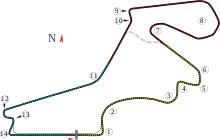
The 2010 Turkish Grand Prix (formally the 2010 Formula 1 Turkish Grand Prix) was a Formula One motor race held on 30 May 2010 at the Istanbul Park, Tuzla, Turkey. It was the seventh round of the 2010 Formula One World Championship and the sixth Turkish Grand Prix. McLaren driver Lewis Hamilton won the 58-lap race starting from second position. His teammate Jenson Button finished second, and Red Bull driver Mark Webber took third.
Webber clinched the pole position and maintained his lead at the start of the race with Hamilton in second who fended off a challenge from Sebastian Vettel in the other Red Bull. The order was maintained until the first sequence of pit stops when Hamilton lost second place after his crew had trouble with fitting one of his tyres correctly. Webber conserved fuel on lap 40 which allowed Vettel to challenge him for the lead but the two collided. Vettel retired and the crash promoted Hamilton and Button to first and second. Hamilton and Button were instructed to conserve fuel for the remainder of the race but the latter had not been given a target lap time and attempted to overtake Hamilton on lap 48 although the former retained the lead which he held for the remaining ten laps to win his first race of the season. (Full article...)
General images
Did you know -
- ... that following a corruption scandal in Turkey, PM Erdoğan reshuffled his cabinet appointing ten ministers, among them nine new – Ala, Çavuşoğlu, Elvan, Güllüce, Işık, İslam, İşler, Kılıç and Zeybekci? (January 31, 2014)
- ... that the Fenari Isa Mosque

- ... that 14th-century Turkish polymath Al-Taftazani completed one of his best-known works at the age of 16? (December 22, 2008) Wikipedia:Recent additions 237
- ... that the Vefa Kilise Mosque

- ... that the Cossack Hetman and the later Muscovite voyevoda Petro Doroshenko signed a treaty with Sultan Mehmed IV recognizing the Cossack Hetmanate as a vassal of the Ottoman Empire? (March 8, 2006) Wikipedia:Recent additions 56
- ... that Turkish female aviator Nezihe Viranyalı was educated in civil aviation at the University of Tennessee following an invitation by the renowned American pilot Jacqueline Cochran? (January 2, 2009) Wikipedia:Recent additions 238
- ... that the female footballer Bilgin Defterli decided to go to Germany because she saw no chance to play football in Turkey due to the dissolution of women's football leagues in 2003? (December 19, 2013)
Selected picture
Selected biography -
Ahmet Necdet Sezer (Turkish pronunciation: [ah'med nedʒ'det se'zæɾ]; born 13 September 1941) is a Turkish statesman and judge who served as the tenth president of Turkey from 2000 to 2007. Previously, he was president of the Constitutional Court of Turkey from January 1998 to May 2000. The Grand National Assembly of Turkey elected Sezer as president in 2000 after Süleyman Demirel's seven-year term expired. He was succeeded by Abdullah Gül in 2007.
Following his legal career, Sezer became a candidate for the presidency with the joint support of many political parties in Parliament. Following the 2000 presidential election, he took an ardent secularist approach on issues such as the headscarf, holding the view that secularism in Turkey was under threat. A quarrel between Sezer and Prime Minister Bülent Ecevit in 2001 led to a financial meltdown, attributed to the weakness of the coalition government as well as to the large debt owed to the International Monetary Fund. (Full article...)
Selected video -
Selected quote -
| “ | Everything we see in the world is the creative work of women. | ” |
Recognized content
Provinces
Related portals
Religions in Turkey
Neighbouring countries
Countries with related heritage
WikiProjects
Turkish wikipedia
 |
There is a Turkish version of Wikipedia, the free encyclopedia. |
Wikimedia
The following Wikimedia Foundation sister projects provide more on this subject:
-
Commons
Free media repository -
Wikibooks
Free textbooks and manuals -
Wikidata
Free knowledge base -
Wikinews
Free-content news -
Wikiquote
Collection of quotations -
Wikisource
Free-content library -
Wikiversity
Free learning tools -
Wikivoyage
Free travel guide -
Wiktionary
Dictionary and thesaurus
Previous Page Next Page



